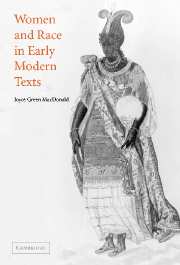Book contents
- Frontmatter
- Contents
- Acknowledgments
- Disclaimer
- Introduction: women, race, and Renaissance texts
- 1 Cleopatra: whiteness and knowledge
- 2 Sex, race, and empire in Shakespeare's Antony and Cleopatra
- 3 Dido and Sophonisba of Carthage: marriage, race, and the bonds between men
- 4 The disappearing African woman: Imoinda in Oroonoko after Behn
- 5 Race, women, and the sentimental in Thomas Southerne's Oroonoko
- 6 Chaste lines: writing and unwriting race in Katherine Philips' Pompey
- 7 The queen's minion: sexual difference, racial difference, and Aphra Behn's Abdelazer
- Conclusion: “The efficacy of Imagination”
- Bibliography
- Index
3 - Dido and Sophonisba of Carthage: marriage, race, and the bonds between men
Published online by Cambridge University Press: 22 September 2009
- Frontmatter
- Contents
- Acknowledgments
- Disclaimer
- Introduction: women, race, and Renaissance texts
- 1 Cleopatra: whiteness and knowledge
- 2 Sex, race, and empire in Shakespeare's Antony and Cleopatra
- 3 Dido and Sophonisba of Carthage: marriage, race, and the bonds between men
- 4 The disappearing African woman: Imoinda in Oroonoko after Behn
- 5 Race, women, and the sentimental in Thomas Southerne's Oroonoko
- 6 Chaste lines: writing and unwriting race in Katherine Philips' Pompey
- 7 The queen's minion: sexual difference, racial difference, and Aphra Behn's Abdelazer
- Conclusion: “The efficacy of Imagination”
- Bibliography
- Index
Summary
At the end of Antony and Cleopatra, I suggested, Antony's invocation of the Aeneid works to affirm that his and Cleopatra's story can be understood as undermining the places of racial and cultural conflict in the founding legend of Romanitas. The two of them will have re-imagined the ending of meetings between east and west, conqueror and client state, male and female. Such an act of cultural will has necessarily required them to construct “new heaven, new earth” (1.1.17) as the ground for this transmutation, a new world which will recognize the erotic as the most powerful engine of human and national destiny.
But in this chapter, I turn to the myth Antony invokes at the moment of his suicide as a way of revaluing the meaning of his life and death. Versions of Rome's founding legends, and particularly of the places occupied in them by women and ideas of their racial and sexual duty, are not as malleable as Antony wishfully pronounces them at the end of his life. My readings of some of these texts of Roman origins suggests instead that looking back to Rome's beginnings reinforces the bonds of gender and of race that Antony and Cleopatra can be glimpsed in the act of attempting to “melt” (“Let Rome in Tiber melt, and the wide arch/Of the ranged empire fall,” 1.1.33–34).
Information
- Type
- Chapter
- Information
- Women and Race in Early Modern Texts , pp. 68 - 86Publisher: Cambridge University PressPrint publication year: 2002
Accessibility standard: Unknown
Why this information is here
This section outlines the accessibility features of this content - including support for screen readers, full keyboard navigation and high-contrast display options. This may not be relevant for you.Accessibility Information
- 1
- Cited by
